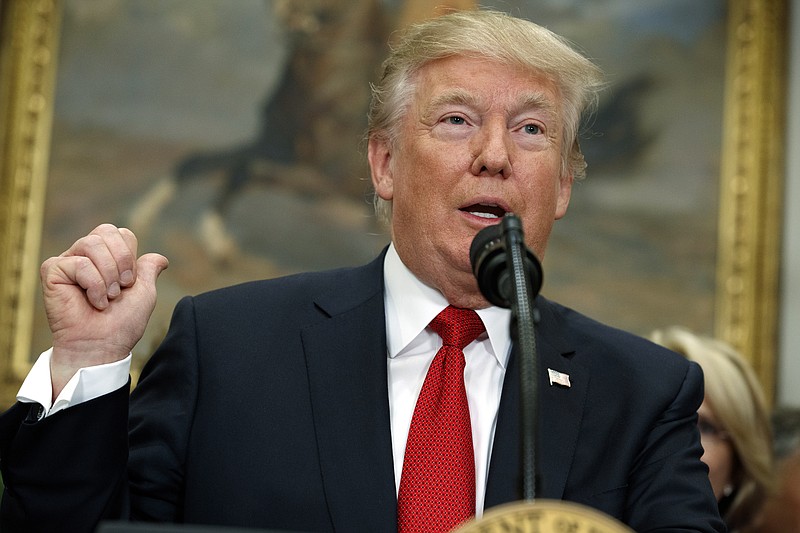WASHINGTON (AP) - President Donald Trump plans to deliver a broad and harsh critique of Iran in a speech Friday declaring that the landmark Iran nuclear deal is not in America's national security interests, according to U.S. officials and outside advisers to the administration.
Trump's speech from the White House will outline specific faults he finds in the 2015 accord but will also focus on an array of Iran's troubling non-nuclear activities, four officials and advisers said. Those include Tehran's ballistic missile program, support for Syrian President Bashar Assad, Lebanon's Hezbollah movement and other groups that destabilize the region.
Under U.S. law, Trump faces a Sunday deadline to notify Congress whether Iran is complying with the accord that was painstakingly negotiated over 18 months by the Obama administration and determine if it remains a national security priority. Although Trump intends to say Iran is living up to the letter of the agreement, he will make the case that the deal is fatally flawed and that its non-nuclear behavior violates the spirit of the regional stability it was intended to encourage, the officials and advisers said.
The officials and advisers, who insisted on anonymity because they were not authorized to publicly preview the speech, said Trump will not call for a re-imposition of nuclear sanctions on Tehran. He will urge lawmakers to codify tough new requirements for Tehran to continue to benefit from the sanctions relief that it won in exchange for curbing its atomic program. And he'll announce his long-anticipated intent to impose sanctions on Iran's Revolutionary Guard Corps by designating it a terrorist organization under an existing executive order, according to the officials and advisers.
In addition, Trump will ask Congress to amend or replace outright the legislation that currently requires him to certify Iranian compliance every 90 days. Officials have said that Trump hates the requirement more than the nuclear deal itself because it forces him to take a position on what he has denounced as the worst deal in American history every three months. That frequency has also irritated aides who have complained that they are spending inordinate amounts of time on certification at the expense other issues.
White House aides initially sought a venue for Trump's address that would project American power and determination. The shuttered former Iranian embassy in Washington was briefly considered before being deemed inappropriate. Officials also considered the Iwo Jima Marine Corps Memorial, which was ruled out because it is currently being renovated.
American allies, who have pressed the White House to remain in the nuclear accord, will be closely watching the president's address. Trump wants to impress on the European parties to the accord - Germany, France and Britain - the importance of fixing what he sees as flaws in the nuclear accord and addressing malign behavior not covered in the agreement.
The Europeans, along with the other parties, Iran, Russia and China, have ruled out reopening the deal. But some, notably France, have signaled a willingness to tackle unresolved issues in supplementary negotiations. Among those issues are the expiration of several restrictions on advanced nuclear activity under so-called "sunset clauses" that will allow Iran to begin ramping up its enrichment capabilities after 10 years, the end of an arms embargo and the eventual easing of demands for a halt to its missile program.
In the speech, Trump hopes to "recruit" the Europeans into joining his broad strategy, particularly by punishing the Revolutionary Guard, which he and his national security team believe is fomenting instability, violence and extremism throughout the Middle East and beyond, according to one official.
In anticipation of Trump's announcements, Republican legislators have drawn up new versions of the law replacing the current 90-day timetable with "semi-annual" certifications, according to two drafts seen by the Associated Press this week.
Both drafts, one from Senate Foreign Relations Committee chairman Bob Corker., and one from committee member and harsh deal critic Sen. Tom Cotton, expand the U.S. certification criteria to include items that are also the province of the U.N. nuclear watchdog and require the U.S. intelligence community to determine if Iran is carrying out illicit activity in facilities to which the International Atomic Energy Agency has not had access.
The certification would also demand that the intelligence community produce judgments on Iranian behavior not covered by the nuclear deal, including missile testing and development, backing for Hezbollah and Assad and threats to Israel and the Mideast more broadly, according to the drafts.
